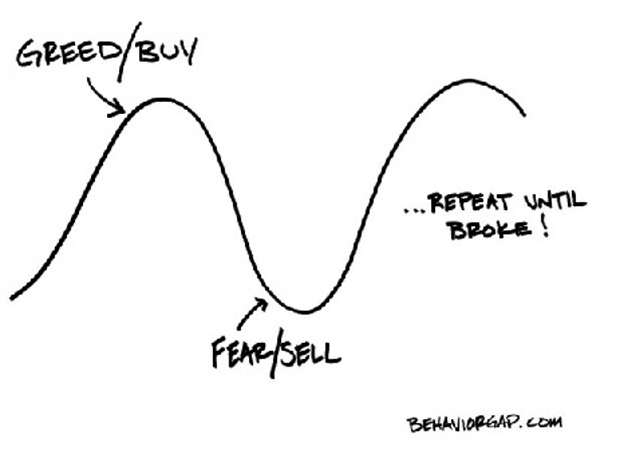It's time to check your risk tolerance, honestly
How risk tolerant are you, really? Sure, stocks are down a tad, but they're still near an all-time high. And that makes it an ideal time to reexamine your risk tolerance and try to get in touch with your true feelings about investing.
First, investors have a long history of buying high and selling low. The pattern is very simple, as Carl Richard's sketch in his book, The Behavior Gap humorously illustrates.
Make no mistake, regardless of what lessons investors think they have learned in the aftermath of market booms and busts, this pattern continues. It did so when investors poured money into stocks at the 2007 high and then fled from them after the 2008 plunge, only to return in 2013 when stocks hit an all-time high yet again.
We know this is irrational, so why do we keep doing this? The answer may be found in Daniel Kahneman's Nobel Prize-winning work on "prospect theory." In very simple terms, prospect theory demonstrates that most human beings experience a greater amount of pain from losing a dollar than the amount of pleasure they experience from gaining a dollar.
For example, many people will turn down a coin flip where heads will win $150 and tails will lose $100. Turning down such a wager is irrational, from an economics perspective.
There's nothing like a raging five-year bull to make us forget our pain. During the financial collapse, I wrote that investors should write down their pain with investing in that moment, and then read it when stocks had recovered. Remembering that pain is a key to investing and breaking the fear-and-greed cycle. And if you took a risk profile questionnaire recently, be very skeptical of the result.
It's possible you may be in denial on how you behaved during the 2008-2009 market crash. When it comes to investing, we all like to believe we're contrarians traveling down the less-beaten path, rather than just following the herd. Comparing your 2008 year-end asset allocation to today's may not make you feel great, but it could make you a better investor.
Finally, you may say you understand your past mistake and won't make it again. Unfortunately, the best predictor of your future behavior is your past. Sure, we now know in hindsight that the real estate bubble didn't cause the next great depression ahead, but the next stock plunge will likely be caused by something else. You really may believe this time it's different.
My advice is that having a consistent allocation to stocks is even more important than having the right allocation. Taking money off the table now to rebalance is essential even though it may be especially hard because so many pundits have been predicting bonds will decline. Ask yourself how well that prediction is turning out so far this year, and remember these predictions are from economists who have forecast the direction of interest rates far less accurately than the 50 percent you'd get from a coin flip.
Never forget that stocks are riskier in a day than high-quality bonds or CDs are in a year, and don't fall for the myth that real interest rates are at an all-time low.
If you take some money off the table now to get back to your asset allocation of a year ago, you may find it less hard to buy more stocks the next time markets plunge.
